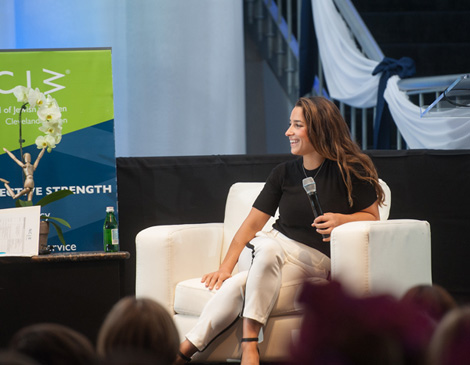Aly Raisman sits poised on the stage with about 300 students staring at her in the audience.
As an Olympic gymnast and gold medalist, she’s used to the spotlight. But as one of hundreds of women and girls who accused Larry Nassar, the former Michigan State University and USA Gymnastics team doctor, of sexual abuse, Raisman is using her experience as a platform to help others.
“If you feel uncomfortable, tell someone. If you tell an adult and they don’t believe you, go to someone else,” she urged the students from about 20 area schools. “Because someone else will care.”
Raisman spoke to students and then at a luncheon Sept. 26 at Landerhaven as a part of National Council of Jewish Women Cleveland’s 124th annual opening meeting. Speaking on a variety of topics from bullying to spotting and reporting abuse, here are three things we took away from her session for students and their parents.
THREE TIPS FOR TEENS
Take care: Whether it involves a hiatus from social media or time to meditate each morning, Raisman urges making self-care a part of everyone’s routine. “If we lived in a world where everyone took care of themselves and was truly happy and really felt loved, the world would be a much better place,” she says.
Trust your gut: Growing up, Raisman was taught to respect her elders. But after being sexually abused by Nassar, who was sentenced to 175 years in prison for abusing hundreds of girls and women, she found that you don’t have to trust someone, no matter who they are, if they make you feel uncomfortable. “If everyone around you loves the adult, but they are making you uncomfortable, it’s OK to speak up,” Raisman says. “The more we talk about it, the more we can make people feel comfortable coming forward.”
Ask questions: Raisman understands that not everyone knows how to spot abuse and report it — especially if it is happening to them. “If you’re confused about something, ask questions,” she says. “If you aren’t sure whether or not something was wrong, if it feels wrong, then it isn’t right.”
THREE TIPS FOR PARENTS
Don’t push: As one of four kids growing up, Raisman was the only gymnast and dedicated incredible amounts of time to practicing and travelling. But as involved as her parents were in her training, they let the coaches do the pushing while watching out for her best interests. “As a kid you want to have that safe space when you come home,” she says. “[Kids] are already pushing themselves and their coaches are pushing them. It is important to teach your kids that it’s not about being the best, it’s about being a good person.”
No means no: Raisman wants to make it clear: No means no. “There’s this part of our society where we like to blame women,” she says. “It doesn’t matter how much she’s had to drink or what she’s wearing, it doesn’t mean she wants to have sex. For the men that say the #MeToo movement is not fair because now they have to be careful — just keep your hands to yourself and respect the women you work with and you will be just fine.”
Be fierce: Raisman wasn’t going to speak at her abuser’s trial. But once she saw the hundreds of other women step forward to tell their story face-to-face with Nassar, she learned how important it is to be brave and she wants to help others do the same. “When you’re fierce or you’re fearless, it doesn’t mean that you’re not afraid,” she says. “You just do it anyways because it’s the right thing to do.”




